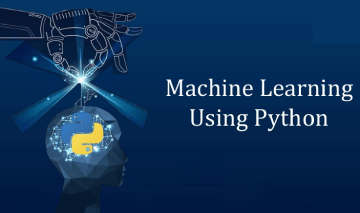No, the course starts with the fundamentals. However, basic Python programming skills are necessary.

Machine Learning With Python Course
Key aspects of machine learning with Python that we focus on include:
- Python's ML Ecosystem: Learn to leverage libraries such as NumPy, Pandas, and Scikit-learn, which form the backbone of machine learning in Python.
- Data Manipulation: Master data preprocessing, cleaning, and feature engineering using Pandas and NumPy, essential skills for any machine learning project.
- Model Development: Implement a wide range of machine learning algorithms, from basic linear regression to more complicated algorithms such as KNN, Random Forest, Decision tree, etc.
- Visualization: Utilize Matplotlib and Seaborn for data visualization and model performance analysis.
- Developing predictive models for business forecasting
- Creating recommendation systems for e-commerce platforms
- Implementing natural language processing for sentiment analysis
- Building image classification systems for automated visual tasks
- Designing anomaly detection systems for fraud prevention
- Constructing time series models for financial forecasting
Why Learn Machine Learning with Python
- Industry Standard: Python is the most widely used language for machine learning in both industry and academia.
- Extensive Libraries: Access a vast ecosystem of libraries and frameworks specifically designed for machine learning tasks.
- Rapid Prototyping: Python's simplicity allows for quick implementation and testing of machine learning ideas.
- Scalability: Learn to develop models that can scale from small datasets to big data applications.
- Versatility: Apply machine learning techniques across various domains, from finance to healthcare to tech.
What You Learn in Our Machine Learning with Python course
- Data preprocessing and feature engineering
- Supervised learning: regression and classification algorithms
- Unsupervised learning: clustering and dimensionality reduction
- Ensemble methods and decision trees
- Model evaluation, validation, and tuning
Who Should Attend
- Software developers interested in adding ML capabilities to their skillset
- Data analysts looking to transition into data science roles
- Business professionals seeking to leverage ML for decision-making
- Researchers wanting to apply ML techniques in their field of study
- Students and professionals planning a career in AI and data science
Prerequisites
- Basic proficiency in Python programming
- Fundamental understanding of statistics and probability
- Basic linear algebra and calculus (helpful but not required)
- Familiarity with data structures and algorithms
Skills & Techniques
- Data cleaning and preparation using Pandas
- Implementing machine learning algorithms with Scikit-learn
- Visualizing data and results using Matplotlib and Seaborn
- Optimizing model performance and hyperparameter tuning
- Deploying machine learning models in production environments
- Applying machine learning to solve real-world problems
Course Structure
Ch. 1
Introduction to Machine Learning
Ch. 2
Machine Learning Mathematical tools
Ch. 3
Linear Algebra (using Scipy)
Ch. 4
Statistics
Ch. 5
Confusion Matrix, ROC
Ch. 6
Machine Learning Software Tools
Ch. 7
Using Jupyter Notebook
Ch. 8
Model Deployment
Ch. 9
Working with Cloud
Ch. 10
Working with Data-Bases
Ch. 11
Implementing Machine Learning with Python
Ch. 12
Data preprocessing, data exploration
Ch. 13
Data modeling, model evaluation
Ch. 14
Cross Validation
Ch. 15
Decision Trees
Ch. 16
SVM
Ch. 17
Time series, Anomaly Detection


Meet your instructor
Alex Shoihat
Head of Machine Learning Departments
Alex holds a B.Sc. in Information Systems and an M.A. in Electrical and Electronic Engineering.
As a Machine Learning Engineer at Embedded Academy, Alex specializes in the field of artificial intelligence, applying over 13 years of experience in project development, management, and transitioning from development to production in various domains such as Linux Embedded.
Throughout his career, Alex developed his expertise working with the integration of Machine Learning and Deep Learning in the Computer Vision and Data Analysis field.
What our graduates say
Machine Learning With Python Course Integration in Other Programs
FAQs
Is prior machine learning knowledge required?
Is the course content updated regularly?
Yes, we continually update the course content to reflect the latest developments in machine learning and Python libraries.
What job roles will this course prepare me for?
This course prepares you for roles such as Machine Learning Engineer, Data Scientist, AI Specialist, and Python Developer with ML skills.
Associated Learning Modules:
Our graduates work here
Blog
News, insights, and learning resources from Embedded Academy

.webp)
.webp)
.webp)
.webp)
















